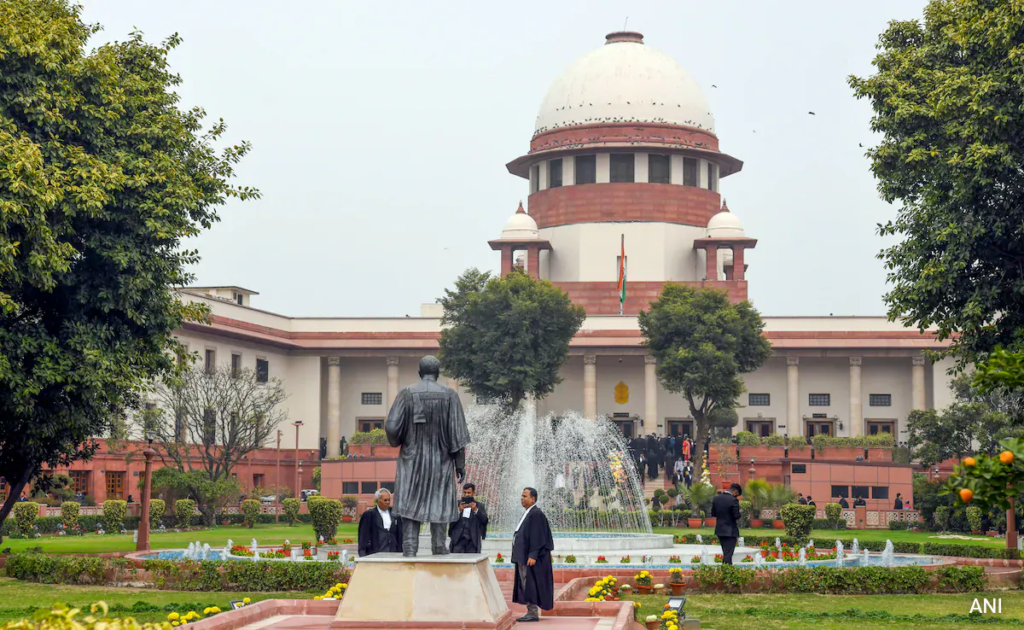Supreme Court Criticizes Great SBI’s Incomplete
Supreme Court-In a significant development, the Supreme Court of India has strongly reprimanded the State Bank of India (SBI) for its failure to provide comprehensive data regarding electoral bonds, a controversial scheme enabling anonymous donations to political parties. The scheme, introduced by the BJP government in 2018 purportedly to enhance transparency in political funding, allowed individuals and businesses to contribute funds without disclosure. However, concerns regarding accountability and potential quid pro quo led to the scheme’s recent annulment by the apex court.

Supreme Court-During a hearing prompted by a petition from the Election Commission, the Supreme Court expressed dissatisfaction with the information furnished by SBI, emphasizing the need for disclosure of electoral bond numbers to establish a clear link between donors and political entities. Chief Justice DY Chandrachud, leading a five-judge bench, underscored the imperative for SBI to reveal these crucial details.
Supreme Court-At the onset of the hearing, Chief Justice Chandrachud queried the representation from the State Bank of India, highlighting the absence of disclosure regarding the bond numbers. The court directed SBI to rectify this deficiency, compelling the bank to elucidate its stance during the subsequent hearing scheduled for March 18.
Supreme Court-The revelation of electoral bond numbers assumes significance in unraveling the clandestine nature of political contributions, facilitating transparency and accountability within the electoral process. By shedding light on the identities of donors and their beneficiaries, this information could potentially expose any undue influence or favoritism exerted through financial channels.
Supreme Court-The electoral bond system, conceived as an alternative to conventional cash donations, garnered considerable controversy since its inception. While proponents argued for its efficacy in curbing black money and fostering clean political funding, detractors raised concerns about its susceptibility to misuse and lack of oversight. The recent judicial intervention, culminating in the scheme’s nullification, reflects the judiciary’s commitment to upholding constitutional principles and safeguarding democratic integrity.
In its plea to the court, the Election Commission underscored the significance of preserving transparency in electoral funding, emphasizing the need for robust mechanisms to monitor and regulate financial contributions to political parties. The court’s directive to SBI to divulge comprehensive data on electoral bonds aligns with these overarching objectives, signaling a pivotal step towards reinforcing accountability within the electoral framework.
The March 11 order, which invalidated the electoral bond scheme, underscored the imperative for SBI to furnish detailed information pertaining to the purchase and redemption of bonds to the Election Commission. This mandate underscores the judiciary’s proactive stance in addressing systemic lacunae and ensuring adherence to legal norms and constitutional provisions.
Furthermore, the Election Commission’s assertion regarding the maintenance of documents submitted in a sealed cover underscores the need for diligent oversight and adherence to procedural norms. The EC’s request for the return of these documents signifies its commitment to complying with the court’s directives and facilitating a thorough examination of pertinent issues related to electoral funding.
In conclusion, the Supreme Court’s scrutiny of SBI’s disclosure practices regarding electoral bonds reflects a broader commitment to upholding democratic principles and ensuring transparency within the electoral process. By demanding comprehensive data on political donations and emphasizing the nexus between donors and beneficiaries, the judiciary reaffirms its role as a custodian of constitutional values and a bulwark against undue influence in governance. As the legal proceedings unfold, the quest for accountability and transparency in political funding remains paramount, underscoring the need for robust regulatory mechanisms and judicial oversight to safeguard the integrity of democratic institutions.

[…] morning, tragedy unfolded within the lively atmosphere of a nightclub nestled in the Broad Ripple neighborhood of Indianapolis. Reports emerged of a shooting incident that claimed the life of one individual and […]